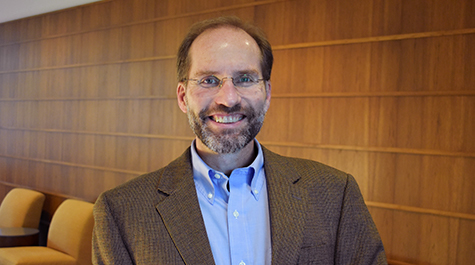Measure what matters
“Assessment” can be a scary word. It strikes fear in the hearts of most students — and plenty of seasoned teachers as well. In an era of high-stakes accountability and an educational system characterized by both broad curricular goals and a new focus on 21st century skills and future-ready students, assessments seem even scarier. Christopher Gareis, professor of educational policy, planning and leadership, is on a mission to change that.
 A former English teacher, middle school principal and division leader, Gareis has become an evangelist of sorts, publishing and speaking around the world on the topic of authentic assessments that tap complex, higher-order thinking and offer an opportunity to develop deeper learning outcomes for students.
A former English teacher, middle school principal and division leader, Gareis has become an evangelist of sorts, publishing and speaking around the world on the topic of authentic assessments that tap complex, higher-order thinking and offer an opportunity to develop deeper learning outcomes for students.
“Teachers need to think of assessment as just another extension of the two things they love — curriculum and instruction,” he says. Through one-day workshops, keynote presentations, and in-depth professional development in partnership with school divisions, Gareis works directly with teachers and schools to expand their thinking about assessments and develop the performance-based assessments and other alternatives to standardized testing that are the right fit for their students.
Gareis was a principal in the early 2000s when high-stakes testing came along. “I lived through that transition, and I was a witness to the unintended consequences — a narrowing of the taught curriculum, a flattened approach to teaching, and simply too much time spent on standardized testing,” he says. “There’s a whole generation of teachers who have only known this high-stakes environment, and our youngest teachers have experienced it as both students and teachers.”
Within the last five years, Virginia policies have tacked back in the opposite direction, reducing the number of standardized tests required for K-12 but mandating that schools replace these assessments with their own locally-developed alternatives. While this change empowers schools and divisions to make their own decisions and promotes the use of authentic assessments, it also requires expertise that may not exist at the local level.
In Gareis’s work with divisions, he stresses the importance of a balanced approach to assessments. Standardized tests have their place, and are an efficient method of assessing students’ mastery of content. But to measure whether or not students are operating at a higher level of thinking, and gaining the skills to transfer their learning to new and unknown contexts, students have to generate their own responses — ideally in multiple formats such as presentations, portfolios, essays and projects.
“If performance-based assessments are well-designed, they are more authentic to the real world and replicate the kind of thinking that students will be asked to perform when they enter the workforce,” says Gareis. “And most importantly, these assessments don’t just measure learning — they become meaningful learning experiences themselves.”
While the concepts of performance-based assessments and deeper learning are universally and intuitively appealing, they are difficult to operationalize. Gareis strives to demystify these practices, coaching teachers through the creation of assessments that enrich the classroom and spark deeper learning.
In 2017, Gareis received Virginia ASCD’s Leadership Award for his collaborative work with the state’s Department of Education and school divisions to modernize and diversify Virginia’s system of assessment.
“Assessment has been described as the Trojan Horse of school reform,” he says. “If we want to change schools, we have to change not only what we’re aiming for students to learn but how we’re measuring it.”
